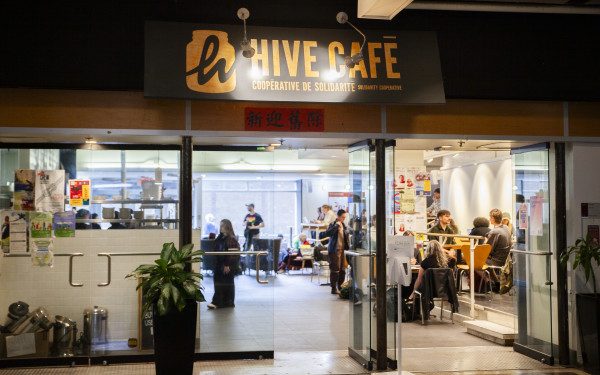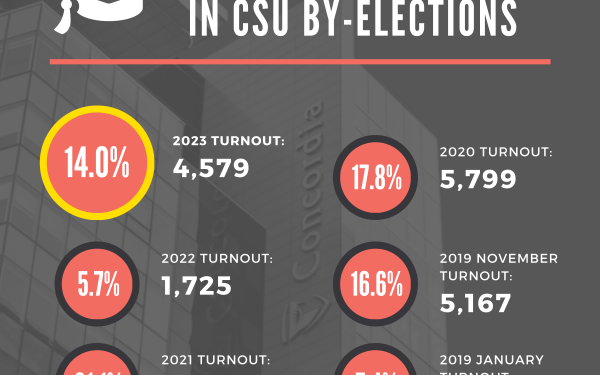The State of the Station
Financial Questions, Governance Issues Remain at CUTV
Concordia University Television might be mired in an uncertain legal grey area, but financially speaking, they could be headed for the red.
Earlier this month, then-provisional Board of Directors member Wendy Kraus-Heitmann diagnosed CUTV as being “not financially sustainable in its current state.”
On Oct. 30, the Concordia Student Broadcasting Corporation passed a motion that declared that the resignation of then-station manager Laura Kneale set off a “loss of financial control that imperiled student funds.”
The next day, Concordia University froze CUTV’s student-funded fee levy account—into which each undergraduate student at Concordia contributes $0.34 per credit—leaving only payroll open.
At that time, CUTV was paying out $1,000 per day to approximately 10 employees.
According to documents obtained by The Link, by Nov. 14 CUTV had already incurred $156,918 in salary expenses. Had this trend continued throughout the rest of the year, CUTV could have spent approximately $296,000 in salary expenses by May 2013.
This level of spending on salary expenses, based on estimated student fee revenue, could have put CUTV at a deficit of approximately $16,000 by May.
However, the provisional Board of Directors took decisive action after assessing this situation and began a process of cutting down working hours and firing some staff.
As it stands, there are only three paid staff members still employed by CUTV—Executive Director Laith Marouf, Web Developer Fahim Moussi and Sound and Music Coordinator Nawar Al-Rufaie.
Throwing Numbers
The question of financial sustainability might seem strange in light of recent numbers being projected by CUTV.
On Nov. 14, CUTV posted on its Facebook page that it was projecting a budget of $500,000 for 2012-2013, a significant increase from the $330,000 it projected in the same post for the previous year.
If student fees make up only 45 per cent of CUTV’s projected budget, as claimed in the Facebook post, this leaves approximately $270,000 to be made up in other revenues.
According to Marouf, this increase takes into account various forms of revenue that the station is said to receive.
“[It comes from] grants, subsidies, donations, sales and services and our co-op for equipment, and memberships from the community. Also, our surplus from last year,” said Marouf in an interview with The Link. “In total, this is our budget—$548,000, I think.”
When asked for documentation to substantiate these claims, Marouf said it would be illegal to disclose the information on the record, due to sensitive information involving staff salaries.
The same Facebook post also claimed that $80,000 was given to the station in the form of donations, for the student strike. Marouf says that this number also includes the Concordia Student Union’s $6,000 donation made in the spring.
During the student strikes last spring, CUTV gained notoriety for their live coverage of daily protests and demonstrations in Montreal.
Throughout the summer months, the station called for donations to aid in funding their equipment to keep the expensive live coverage afloat, and is said to have received a significant response.
Several months later, where those funds are—and what’s been done with them—isn’t totally clear.
“They are all on PayPal, most of them, and some of were moved over the summer to pay for the bills of the live broadcast,” said Marouf.
“It also includes a lot of money that is not from PayPal. It includes cheques from unions all across the province.”
According to Marouf, those funds remain within the PayPal account.
“I can see what happens in it, but I am not a signing authority on it,” said Marouf.
“As far as the total amount of donations that were made, the CSBC were given $10,000 in May of 2012 with which they paid a livestream bill of $9,636. The CSBC never saw the rest. It was never within our control.”
——Patrice Blais, CSBC Board Member
Outstanding Invoices
Though this donation money is said to have been accrued to pay for the live coverage of the strike, it remains unclear how much of it has been spent for that purpose.
Documents obtained by The Link show $19,933 in outstanding invoices from Novanet Communications Ltd., a Canadian telecommunications services and solutions provider, to CUTV.
According to Marouf, the current lack of a Board means that no cheques can be signed to pay Novanet for the outstanding balance.
The responsibility to pay these bills should have apparently fallen on the station manager prior to her resignation, he said.
Some invoices, however, are currently overdue by as many as 119 days, the first of which dates back to June 31, when CUTV’s provisional Board, which included Marouf, was in place.
Prior to that, the Concordia Student Broadcasting Corporation, the umbrella organization that once held CUTV and that still currently oversees CJLO, Concordia’s radio station, dealt with some of these payments.
“As far as the total amount of donations that were made, the CSBC were given $10,000 in May of 2012 with which they paid a livestream bill of $9,636,” said Patrice Blais, CSBC Board member and former member of CUTV’s provisional Board. “The CSBC never saw the rest. It was never within our control.”
In order to broadcast live events—such as the demonstrations over the spring and summer—CUTV uses two products, in addition to its camera and sound equipment.
The outstanding invoices come from the LiveU backpacks that CUTV rented through Novanet at a monthly cost, which includes a certain amount of broadcast time. If that time is exceeded, CUTV would have to pay a premium.
In order to offset that broadcasting limit, CUTV rented out a second backpack.
“My recollection is that the reason we got an additional backpack was because we kept going over the allotted hours,” said Moussi.
“By getting a second backpack, we were able to use the second unit to broadcast whenever our first unit was close to its 30-hour mark. This basically prevented us from paying overages, however we did have to rent this new backpack at an additional cost.”
According to Marouf, the issue of payment will only be able to be resolved after a general assembly, which has been planned for the weekend of Dec. 1.
“The contractors are fine with the understanding that a general assembly is happening to bring in the signing officers,” he said. “There are no signing officers to pay anything right now.”
Moussi made it a point, however, to make clear that what CUTV did with this equipment was ultimately invaluable.
“I would stress that these costs, as undesirable as they were/are, certainly pale in comparison to the value of the coverage it enabled,” said Moussi.
“I should also hope that this experience will serve as an opportunity to learn how to better budget and plan the coverage of live demonstrations, as they are—without a doubt, as most of CUTV’s community would attest—a core of CUTV’s involvement in the community and media spheres of Montreal.”

_1_700_945_90.jpg)





